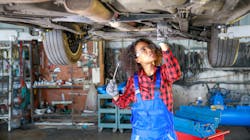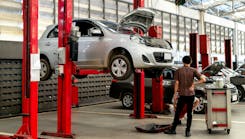Answer this for me: Why are culinary classes offered, even required, in most high schools, but a basic automotive course isn’t? Eating is essential for survival, but don’t most people rely on their cars for transportation to get to their job that pays for that food?
We rely on cars so much these days to take us to work and keep our families safe when traveling. How is it so many people drive a machine every day that they know so little about? In fact, 26 percent of Americans can’t change their own car tires. Shocking, isn’t it? School is supposed to prepare kids for the real world and workforce, but there are clearly a few missing links.
Why automotive isn’t being taught in high school
Unfortunately, there are a number of reasons automotive classes aren’t being offered in high school. Some of what we hear includes:
- Not enough time in a semester to develop basic skills
- Not a required course
- Not enough student interest
- No budget or supplies
- Safety concerns
- Not enough instructors
While there are some legitimate reasons for not offering an automotive course in high school (i.e., not enough instructors, etc.), the majority of what we hear seems to be more excuses than anything else. To me, this means there needs to be more education around the value of offering an automotive class at the high school level. Let’s take a look…
3 reasons automotive skills need to be taught in high school
1. Inspire young students
If students aren’t exposed to skilled trades in high school, then how are they going to know if it’s a viable career path for them after graduation? In a recent TIME article, author Ken Robinson, Ph.D., wrote about bridging the gap between academic and vocational programs. He said offering shop class allows students who’ve been slumbering through school to wake up.
“Those who thought they weren’t smart find that they are. Those who feared they couldn’t achieve anything discover they can. In the process, they build a stronger sense of purpose and self-respect.” -Ken Robinson, Ph.D & Author
Not every student is meant to go to a business college or medical school. Some enjoy knowing how things work and fixing them with their hands. A technician or career in skilled trades is a great choice for these types of students. Every student has different strengths and interests. School is a chance for students to explore different fields to see what they like and what they are good at so they can pursue a career that interests them after graduation.
"[Auto shop class] shouldn't be intended to make [high school students] into technicians necessarily, but it should be designed to make them begin to be mechanically inclined. Tool manipulation, deductive reasoning, hand-eye coordination, and problem-solving are all skills the auto shop can help unearth and either grow into a real interest or, at least, a basic understanding." -Mike Baldwin, Service Manager
2. Save on future maintenance and make better car decisions
In a poll performed by Transmission City, it was found the average American spends almost $400 a year on car repairs and maintenance. If students were given the skills in school to change their own oil, for instance, that could help save them money to use towards bills or expenses in the future.
Even if students don’t perform their own repairs or maintenance, just having the smallest amount of car knowledge could help them make better car-buying and maintenance decisions in the future. A 2016 AAA survey found 73 percent of customers said they have been overcharged by auto repair shops. Having basic automotive knowledge could help students avoid issues like this and make them feel more comfortable making decisions around their car.
"Everyone should know how to change the oil, check brakes, and have basic auto knowledge. Technical education is so underrated." -Tanya Blehm, Manager
3. Hands-on training with real-world context
Auto shop class is the perfect link between learning and application of studies. Students get hands-on training that leads to stable careers in the skilled trades.
Not only is shop class linked to real-life skills, but students also get to apply their knowledge from other school subjects in the shop. The understanding of mathematical fractions is essential in auto mechanics since any bolt less than an inch is referred to as a fraction. Plus, calculating torque, engine size, horsepower, and more are all ways technicians use math in the shop.
"[Auto knowledge] is like many other things, a life skill that is needed." -Bob Leonard, Advanced Mobility Tech
Successful auto shop classes are possible
Paulding County High School: Setting students up for success
Automotive Instructor, Leroy Goodwin, from Paulding County High School teaches close to 100 students in his class per semester. His classes continue to grow in size despite not being able to provide a lot of hands-on training in the shop due to COVID-19. Leroy strives to successfully prepare each and every one of his students for working in the industry, despite having an annual budget of only $7,000. To purchase more shop supplies for his growing number of students Leroy took it upon himself to gather sponsorships and donations to raise over $30,000.
"Many years ago it seems most children were taught the basics of checking a vehicle by their parents. Today, if it doesn't come across their insta feed, they don't learn it. Personally, I think it should a requirement to obtain your driver's license." -Damon Agostino, Automotive Technician
Valley Forge High School: Providing real shop training experience
Another successful auto program can be found at Valley Forge High School located in Parma Heights, Ohio. Gary Mitchhart has been the instructor of the class for the past 10 years. He continues to keep the equipment his students train on current (no older than 7 years) to keep up with new industry technology. Students begin training in 11th grade through a combination of classroom and shop instruction beginning with auto training. This ASE Education Foundation (formerly known as National Automotive Technicians Education Foundation) program gives students experience on what it is like to work in a real shop with its multiple lifts, wheel alignment systems, and more.
Article originally published on WrenchWay.com



